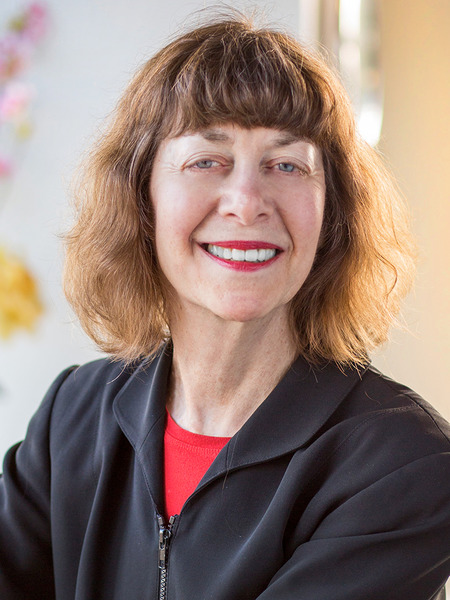Thirty Years of Connect Education Workshops: A Q&A with Dr. Carolyn Messner
 Carolyn Messner, DSW, OSW-C, FAPOS, FAOSW, LCSW-R, CancerCare’s Director of Education and Training, remembers the first CancerCare Connect Education Workshop as if it was yesterday. “It was a snowy day in March thirty years ago, and we held a telephone workshop on doctor-patient communication called, ‘Doctor, Can We Talk?’ About 30 people signed up, and it was an amazing experience,” she recalls. “I could feel it was the start of something special.”
Carolyn Messner, DSW, OSW-C, FAPOS, FAOSW, LCSW-R, CancerCare’s Director of Education and Training, remembers the first CancerCare Connect Education Workshop as if it was yesterday. “It was a snowy day in March thirty years ago, and we held a telephone workshop on doctor-patient communication called, ‘Doctor, Can We Talk?’ About 30 people signed up, and it was an amazing experience,” she recalls. “I could feel it was the start of something special.”
Dr. Messner pioneered and directed the first patient education workshop program conducted over the phone and, as technology grew, simultaneous webcasts. What began with a single shared telephone call in 1990 now encompasses a program with more than 70 annual workshops. In this Q&A, Dr. Messner discusses the program’s origin, the dedication shown by our expert speakers and the remarkable experiences of our participants.
How and why was the Connect Education Workshop program founded?
In the 1980s, I was leading CancerCare’s education and training workshops, all of which were in-person. One day before a workshop, a woman called to say that she wouldn’t be able to attend because of her treatment side effects, but hoped we could send the handouts from the session. To me, handouts aren’t equivalent to participating in a live program: you miss the speaker, the Q&A and the experience of being with other people. This woman’s experience started my thinking about how we could make our programs more accessible.
By holding workshops over the telephone, by webcast and through podcasts, we maximize the number of people who benefit from the information our speakers are sharing. If you are experiencing fatigue and can’t leave home, can’t afford to travel or you’re simply too busy to get away, you can join our programs from anywhere.
Being able to participate remotely is especially important these days. How has the coronavirus pandemic affected your workshops?
Because these were already telephone and online programs, we didn’t lose any steam. We have a history of never cancelling workshops; even on September 11, 2001, we still proceeded with a scheduled program because we knew how critical the information was to our participants. Similarly, the pandemic made our information even more vital because people needed guidance about how to minimize their risk. All our sessions since early March have acknowledged that everyone’s lives have been impacted by the pandemic. We’ve also dedicated three workshops to the coronavirus and cancer so far, and we’re currently scheduling a fourth workshop.
Can you tell us more about the speakers who participate in each call?
Our expert speakers are the key to keeping our programs current in the rapidly advancing field of oncology. For instance, for many years we held workshops on managing chemotherapy-induced nausea and vomiting (CINV), but then one of our long-term speakers, an oncologist, clarified that the conversation was shifting from CINV management to CINV prevention because the health care team is now better at anticipating and treating CINV before patients experience it. Guided by his insight, I adjusted the workshop to best reflect current standards of care and practice.
All of our medical experts treat patients in clinics at NCI-Designated Cancer Centers, which helps us bring cutting-edge knowledge to our participants. We also involve multidisciplinary experts like nurses, dietitians, pathologists, geneticists, supportive care specialists and more. Cancer may be frightening and overwhelming, but these presenters always find a way to make even the most complicated information understandable in layman’s language.
What role do you feel Connect Education Workshops play in a person’s cancer experience?
For the newly diagnosed, our workshops provide an accessible starting point for those facing questions about treatment options and how their lives may change. For others, participating in our Q&A segments gives a boost of confidence from our speakers’ empathetic answers, encouraging them to ask their questions to their treating health care team. Still others find comfort in simply listening and find inspiration in the speakers’ words. I’ll always remember one woman who told me that she frequently replayed a particular workshop because the presenters’ words inspired her and helped her live with her cancer.
Throughout these workshops, our goal is to help our participants learn that they may have better-informed conversations with their health care teams based on what they learn through these programs. These discussions may be about treatment, but also highlight the importance of sharing your priorities, life goals, responsibilities and activities that give meaning and purpose to your life. I encourage all our participants to utilize the many free programs and services offered by CancerCare. For three decades, that’s the message we have shared and continue to share in each of our programs.
To view all upcoming CancerCare Connect Education Workshops and to register, visit cancercare.org/connect. You can also browse recordings of previous workshops at cancercare.org/podcasts or listen on Apple Podcasts, Google Podcasts and Spotify.
